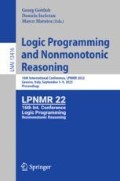Abstract
Logic programs (LPs) and argumentation frameworks (AFs) are two declarative knowledge representation (KR) formalisms used for different reasoning tasks. The purpose of this study is interlinking two different reasoning components. To this end, we introduce two frameworks: LPAF and AFLP. The former enables to use the result of argumentation in AF for reasoning in LP, while the latter enables to use the result of reasoning in LP for arguing in AF. These frameworks are extended to bidirectional frameworks in which AF and LP can exchange information with each other. We also investigate their connection to several general KR frameworks from the literature.
The second author has been partial supported by NSF grants 1914635, 1757207, 1812628.
Access this chapter
Tax calculation will be finalised at checkout
Purchases are for personal use only
Notes
- 1.
- 2.
Note that an AF extension represents whether an argument is accepted or not. If an argument a is not in an extension E, a is not accepted in E. Then \(not\,a\) in LP becomes true by NAF.
- 3.
We consider the well-founded model as the set of true atoms under the well-founded semantics.
References
Baumann, R.: Context-free and context-sensitive kernels: update and deletion equivalence in abstract argumentation. In: Proceedings of the ECAI 2014, pp. 63–68. IOS Press (2014)
Besnard, P., Hunter, A.: Constructing argument graphs with deductive arguments: a tutorial. Argum. Comput. 5(1), 5–30 (2014)
Bodanza, G., Tohmé, F., Auday, M.: Collective argumentation: a survey of aggregation issues around argumentation frameworks. Argum. Comput. 8(1), 1–34 (2017)
Brewka, G., Eiter, T.: Equilibria in heterogeneous nonmonotonic multi-context systems. In: AAAI’07, pp. 385–390 (2007)
Caminada, M., Sá, S., Alcântara, J., Dvor̆ák, W.: On the equivalence between logic programming semantics and argumentation semantics. J. Approx. Reason. 58, 87–111 (2015)
Dung, P.M.: On the acceptability of arguments and its fundamental role in nonmonotonic reasoning, logic programming and \(n\)-person games. Artif. Intell. 77, 321–357 (1995)
Dung, P.M., Kowalski, R.A., Toni, F.: Assumption-based argumentation. In: Rahwan, I., Simari, G.R. (Eds.) Argumentation in Artificial Intelligence, pp. 199–218. Springer, Boston (2009). https://doi.org/10.1007/978-0-387-98197-0_10
Dvorák, W., Dunne, P.E.: Computational problems in formal argumentation and their complexity. In: Handbook of Formal Argumentation, pp. 631–688. College Publications (2018)
Eiter, T., Leone, N., Saccá, D.: Expressive power and complexity of partial models for disjunctive deductive databases. Theor. Comput. Sci. 206, 181–218 (1998)
Eiter, T., Fink, M., Woltran, S.: Semantical characterizations and complexity of equivalences in answer set programming. ACM TOCL 8(3), 17 (2007)
Gelfond, M., Lifschitz, V.: The stable model semantics for logic programming. In: Proceedings of the JICSLP, pp. 1070–1080. MIT Press (1988)
Hunter, A.: A probabilistic approach to modelling uncertain logical arguments. J. Approx. Reason. 54, 47–81 (2013)
Coste-Marquis, S., Devred, C., Marquis, P.: Constrained argumentation frameworks. In: Proceedings of the KR’06, pp. 112–122 (2006)
Przymusinski, T.C.: Stable semantics for disjunctive programs. New Gen. Comput. 9, 401–424 (1991)
Sakama, C., Son, T.C.: Interlinking logic programs and argumentation frameworks. In: Proceeding of the NMR-2021, pp. 305–314 (2021). https://sites.google.com/view/nmr2021/home
Van Gelder, A., Ross, K., Schlipf, J.S.: The well-founded semantics for general logic programs. J. ACM 38, 620–650 (1991)
Author information
Authors and Affiliations
Corresponding author
Editor information
Editors and Affiliations
Rights and permissions
Copyright information
© 2022 The Author(s), under exclusive license to Springer Nature Switzerland AG
About this paper
Cite this paper
Sakama, C., Son, T.C. (2022). Interlinking Logic Programs and Argumentation Frameworks. In: Gottlob, G., Inclezan, D., Maratea, M. (eds) Logic Programming and Nonmonotonic Reasoning. LPNMR 2022. Lecture Notes in Computer Science(), vol 13416. Springer, Cham. https://doi.org/10.1007/978-3-031-15707-3_25
Download citation
DOI: https://doi.org/10.1007/978-3-031-15707-3_25
Published:
Publisher Name: Springer, Cham
Print ISBN: 978-3-031-15706-6
Online ISBN: 978-3-031-15707-3
eBook Packages: Computer ScienceComputer Science (R0)

